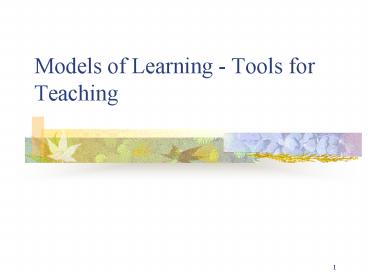Models of Learning - Tools for Teaching - PowerPoint PPT Presentation
1 / 17
Title:
Models of Learning - Tools for Teaching
Description:
Title: Principles of Teaching Author: Chan Yiu Man Last modified by: Fanny Created Date: 3/7/2002 1:17:06 PM Document presentation format: (4:3) – PowerPoint PPT presentation
Number of Views:351
Avg rating:3.0/5.0
Title: Models of Learning - Tools for Teaching
1
Models of Learning - Tools for Teaching
2
We learn
10
Of what we see
20
Of what we discuss with others
30
Of what we experience personally
50
Of what we teach someone else
60
Of what we read
70
Of what we write
80
Of what we hear
90
Of what we both see and hear
3
Reflective Questions
- What is your learning style?
- What is your individual percentage of the 3
learning styles? - What is the common learning style in your group?
- What do you expect your teachers teaching style?
4
VAK Test
5
VAK Test
6
VAK Test
- http//www.vaknlp.com/vak.htm
- http//203.80.0.224/pdf_edu/20100429/SMP_007_024-4
C.PDF - http//revo-create.com/viewthread.php?tid52292
7
What is your learning style?
- Visual (V)
- Auditory (A)
- Kinesthetic (K)
8
Understand your responses
9
Kolbs Four Learning Styles
- SENSING/FEELING
- Concrete Experiences
- Accommodators Divergers
- DOING WATCHING
- Testing implications Observation
- of concepts in new Reflections
- situations Convergers Assimilators
- THINKING
- Formation of abstract concepts and
generalizations
10
Four Principles of Teaching
- The Information Processing Family of Models (e.g.
inductive thinking, concept attainment, advance
organizers, cognitive growth, scientific inquiry,
mnemonics, etc.) - The Social Family of Models (e.g. group
investigation, social inquiry, jurisprudential
inquiry, laboratory method, role playing, etc.) - The Personal Family of Models (e.g. Nondirective
teaching, awareness training, classroom meeting,
self-actualization, conceptual systems, etc.) - The Behavioural Systems Family of Models (e.g.
Social learning, mastery learning, programmed
learning, simulation, etc.)
11
Behavioural Approach - Example of the Behavioural
Systems Family of Models
- Change the behaviour -
- Stimulus
- Behaviour
- Reinforcement
12
Cognition - Example of the Information Processing
Family of Models
- How the mind works
- Cognitive-developmental model people progress
from infancy though childhood into adulthood
(children learn based on experience) - Information processing model input, processes
and output
13
Social Learning - Example of the Social Family of
Models
- Observational learning we learn by observing
the hehaviour of others - Attention
- Retention
- Reproduction
- Motivation
14
Humanistic approach - Example of the Personal
Family of Models
- Affective or emotional components of learning
- Children-centred
- Self-actualization
15
Good teaching
- Care and supportive to students
- Use of various teaching methods
- Active and co-operative learning
- Creative and flexible learning
- Committed, effective and communicative teaching
- Knowledgeable and clear instructions
- Firm, fair and high expectation
- Reflective and responsive teaching
16
????
- 1. ????????????????????,?????
- 2. ???????????,????????,??????,??????????????,????
????,??????????????
17
????
- 3. ????????,??????????,??????????????
- 4. ??????????, ?????????????????































